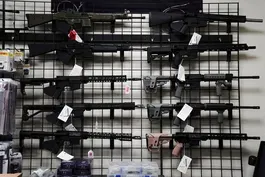
Israel launches new assault on Khan Younis
Clip: 7/2/2024 | 7m 34sVideo has Closed Captions
Israel launches assault on Khan Younis after previously claiming it destroyed Hamas there
Israel launched air strikes into Khan Younis overnight, a part of Gaza it had already assaulted and left a few weeks ago. A ground operation now seems likely. It's not the first time Israeli forces claimed to clear Hamas from an area, only to return weeks or months later. Amna Nawaz discussed more with Daniel Byman, author of "A High Price: The Triumphs and Failures of Israeli Counterterrorism."
Problems with Closed Captions? Closed Captioning Feedback
Problems with Closed Captions? Closed Captioning Feedback
Major corporate funding for the PBS News Hour is provided by BDO, BNSF, Consumer Cellular, American Cruise Lines, and Raymond James. Funding for the PBS NewsHour Weekend is provided by...

Israel launches new assault on Khan Younis
Clip: 7/2/2024 | 7m 34sVideo has Closed Captions
Israel launched air strikes into Khan Younis overnight, a part of Gaza it had already assaulted and left a few weeks ago. A ground operation now seems likely. It's not the first time Israeli forces claimed to clear Hamas from an area, only to return weeks or months later. Amna Nawaz discussed more with Daniel Byman, author of "A High Price: The Triumphs and Failures of Israeli Counterterrorism."
Problems with Closed Captions? Closed Captioning Feedback
How to Watch PBS News Hour
PBS News Hour is available to stream on pbs.org and the free PBS App, available on iPhone, Apple TV, Android TV, Android smartphones, Amazon Fire TV, Amazon Fire Tablet, Roku, Samsung Smart TV, and Vizio.
Providing Support for PBS.org
Learn Moreabout PBS online sponsorshipAMNA NAWAZ: Israel launched airstrikes into Khan Yunis overnight, a part of Gaza it already assaulted and left a few weeks ago.
A ground operation now seems likely.
It's not the first time in this now-nine-month war that Israeli forces have claimed to clear Hamas from an area, only to return weeks or months later.
In the streets of Khan Yunis today, pain and prayers for the dead, as residents mourn, Palestinians killed overnight in Israeli bombardment.
The strikes came a day after Israel ordered a mass evacuation from much of the city in response to a barrage of rockets, it said were fired from Khan Yunis into Israel.
Many of those forced to flee have already been displaced multiple times.
They escape any way they can, carrying only their most crucial belongings.
AHMED AL-BAIRAM, Displaced Palestinian (through translator): God knows where we will go tomorrow.
It is tiring.
This time, we did not take anything with us.
There is no time to carry anything.
AMNA NAWAZ: For wounded Palestinians, there's also no place for lifesaving care.
The European Hospital, one of the last functioning hospitals in Khan Yunis, is now virtually empty.
Patients are being transferred to the nearby Nasser Hospital, already packed full.
Earlier this year, Israel had already largely withdrawn from Khan Yunis and is now ordering Palestinians to evacuate to the humanitarian safe zone of Al-Mawasi in anticipation of a new ground assault.
This isn't the first time the Israeli military has assaulted parts of Gaza it said it had already cleared of Hamas, including parts of Gaza City and Jabalia in the north.
For months, the U.S., Qatar and Egypt have tried to negotiate a cease-fire deal between Israel and Hamas, but progress has stalled.
A top Israeli military official told The New York Times the army is short of munitions and wants a pause in the fighting in Gaza.
But, today, Prime Minister Benjamin Netanyahu denied the claims.
BENJAMIN NETANYAHU, Israeli Prime Minister (through translator): We will end the war only after we achieve all of its goals.
We do not give in to the winds of defeat, not in The New York Times and not anywhere else.
AMNA NAWAZ: For more on Israel's military campaign in Gaza, we turn to Daniel Byman.
He's a professor at Georgetown University and the author of "A High Price: The Triumphs and Failures of Israeli Counterterrorism."
Professor Byman, let me ask you about this policy now, this -- this pattern, rather, of the IDF going back into areas it had previously cleared and left in Gaza.
What does it tell you about how the military campaign is going?
Does it signify a setback, or is this kind of pattern to be expected in this warfare?
DANIEL BYMAN, Georgetown University: This kind of pattern is to be expected because of, frankly, a flaw in how Israel has approached Gaza from the start.
It's gone in.
It's tried to kill Hamas fighters, remove them.
But it hasn't left enough forces to garrison much of the strip.
And, as a result, when Israeli forces leave, Hamas reconstitutes itself.
And this is a lesson that the United States learned the hard way in Afghanistan and especially Iraq, which is that you need to have something governing the territory you conquer.
And Israel has failed to do that.
AMNA NAWAZ: So, the stated goal, as you know, has been to eliminate Hamas.
Is that actually a reachable goal, based on what you have seen?
DANIEL BYMAN: Completely eliminating Hamas is unrealistic.
This is an organization that not only has over 25,000 fighters under arms before the war began, but also has extensive social and educational and religious networks in Gaza.
Israel can reduce Hamas' military strength, can make it harder for the organization to fight as a large, coherent force.
But Hamas is going to be a presence in Gaza, at least for the short and medium term.
And that's going to be very hard for Israel to change.
AMNA NAWAZ: We cited that New York Times' new report quoting some top Israeli army officials saying they want to pause in the fighting, they're running out of munitions.
Prime Minister Netanyahu has denied those reports.
But I'm curious for your reaction to them.
What do you make of that?
DANIEL BYMAN: So the Israeli military has to worry about three different wars.
First, of course, is the war on Gaza, and it's using many munitions for that.
My sense is that it does have enough munitions to continue that on a day-to-day basis, but that is costing a lot of Israel's ammunition stocks.
But Israel also has two other wars.
One is the limited war that's going on across the border with Lebanon, where it's fighting the Lebanese Hezbollah.
Here, we have seen literally thousands of attacks across the border, and well over 100 people have died on the Lebanese side, over a dozen Israelis.
And this conflict is not only something that's ongoing, but Israel fears it can become a full-bore conflict.
And, if so, it would dwarf what we have seen in Gaza.
Hezbollah is a much more formidable force than Hamas, and the Israeli military would need a lot of munitions for this, and it wants to keep some in reserve for that possibility.
And the last, as we saw in April, is an open shooting war with Iran.
And when this happened in April, Israel used its missile defense forces and really did only a very limited retaliation against Iran itself.
But the possibility that Iran could become directly involved in a much bigger conflict is also something that the Israeli military has to worry about.
AMNA NAWAZ: Professor, we should note that one of the reasons Israel continues to fight in Gaza is also because Hamas continues to launch attacks on Israel from inside Gaza.
This latest Israeli airstrike overnight, they say, was in response to one such attack.
How does Hamas, almost nine months into this war, still have the capability to carry out those kinds of attacks?
DANIEL BYMAN: So, Hamas has prepared for this war for -- really for years.
And we know that it has amassed massive ammunition stockpiles and rocket stockpiles.
We saw some of this, of course, on October 7 itself, which also involved massive rocket and missile attacks on Israel.
So it's not surprising that Hamas has kept some in reserve, probably in tunnels or other facilities that are relatively secure.
My sense is that Israel has destroyed a lot of this.
This has been a real success of Israel's invasion of Gaza.
But it's hard to go completely to zero, and Hamas certainly retains some capability, including a capability to try to attack Israel directly.
AMNA NAWAZ: I have less than a minute left, but I wonder if you can briefly summarize for us.
Based on U.S. war conduct you have seen in other nations, when you look at the way Israel's conducted this war inside Gaza, have you ever -- do you see any comparison there between what Israel is doing and what you have seen the U.S. do in other places?
DANIEL BYMAN: So, when the U.S. first went into Iraq and was fighting insurgents there, it often cleared them out, but failed to secure territory.
What Israel needs to do is establish a government in Gaza, ideally, a Palestinian government, and until it does that, it's going to face significant problems.
AMNA NAWAZ: That is Professor Daniel Byman from Georgetown University joining us tonight.
Professor, thank you so much for your time and insight.
We appreciate it.
DANIEL BYMAN: My pleasure.
Abortion restrictions disproportionately impact Black women
Video has Closed Captions
How abortion restrictions have disproportionately impacted Black women (8m 57s)
A Brief But Spectacular take on dreaming of home
Video has Closed Captions
A Brief But Spectacular take on dreaming of home (3m 19s)
Grateful Dead drummer on the role rhythm plays in his art
Video has Closed Captions
Grateful Dead drummer Mickey Hart combines music and art at the Las Vegas Sphere (6m 6s)
Historian discusses Supreme Court's immunity decision
Video has Closed Captions
Historian discusses Supreme Court's immunity decision and shift in presidential powers (6m 6s)
Laws on tracking gun sales highlight divide between states
Video has Closed Captions
New laws on tracking gun sales highlight divide between blue and red states (6m 34s)
Scottish oil town hopes to be Europe’s green energy capital
Video has Closed Captions
Scottish oil town hopes to be Europe’s green energy capital with transition to renewables (8m 28s)
Providing Support for PBS.org
Learn Moreabout PBS online sponsorshipSupport for PBS provided by:
Major corporate funding for the PBS News Hour is provided by BDO, BNSF, Consumer Cellular, American Cruise Lines, and Raymond James. Funding for the PBS NewsHour Weekend is provided by...

















